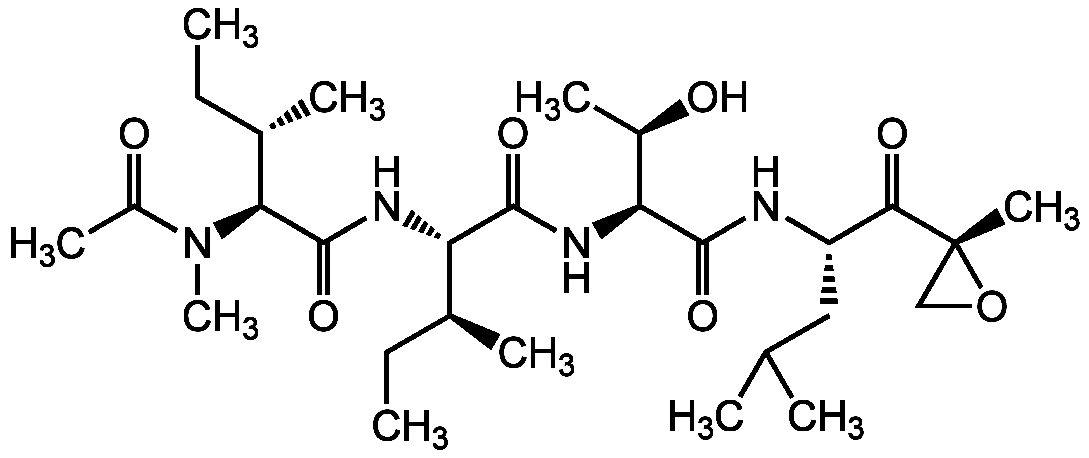Epoxomicin
Product Code: AG-CN2-0422
Product Group: Natural Products and Extracts
Supplier: AdipoGen Life Sciences
| Code | Size | Price |
|---|
| AG-CN2-0422-C050 | 50 ug | £80.00 |
Quantity:
| AG-CN2-0422-C100 | 100 ug | £125.00 |
Quantity:
| AG-CN2-0422-C250 | 250 ug | £220.00 |
Quantity:
| AG-CN2-0422-C500 | 500 ug | £330.00 |
Quantity:
Prices exclude any Taxes / VAT
Overview
Regulatory Status: RUO
Shipping:
Ambient
Storage:
+4°C
Images
Further Information
Alternate Names/Synonyms:
Antibiotic BU 4061T
Appearance:
White to off-white solid.
CAS:
134381-21-8
EClass:
32160000
Form (Short):
liquid
Handling Advice:
Keep cool and dry.Protect from light and moisture.
InChi:
InChI=1S/C28H50N4O7/c1-11-16(5)21(30-27(38)23(17(6)12-2)32(10)19(8)34)25(36)31-22(18(7)33)26(37)29-20(13-15(3)4)24(35)28(9)14-39-28/h15-18,20-23,33H,11-14H2,1-10H3,(H,29,37)(H,30,38)(H,31,36)/t16-,17-,18+,20-,21-,22-,23-,28+/m0/s1
InChiKey:
DOGIDQKFVLKMLQ-JTHVHQAWSA-N
Long Description:
Chemical. CAS: 134381-21-8. Formula: C28H50N4O7. MW: 554.7. Synthetic. Antibiotic. Potent anticancer compound. Cell permeable, potent, selective and irreversible 20S proteasome inhibitor. Predominantly inhibits the chymotrypsin-like (CTRL) activity of the proteasome. Exhibits lower level inhibition of proteasome trypsin-like and caspase-like activitives (100 and 1,000-fold slower rates respectively). Anti-inflammatory. Antimicrobial and antimalarial. Anti-parasitic. Stimulates bone formation by inhibiting osteoblast proteasome activity. Induces Parkinson's-like symptoms in rats. The ubiquitin-proteasome system (UPS) and autophagy serve as two complementary, reciprocally regulated protein degradation systems. Blockade of UPS by Epoxomicin activates autophagy.
MDL:
MFCD03791061
Molecular Formula:
C28H50N4O7
Molecular Weight:
554.7
Package Type:
Vial
Product Description:
Antibiotic [1]. Potent anticancer compound [1, 7]. Cell permeable, potent, selective and irreversible 20S proteasome inhibitor. Predominantly inhibits the chymotrypsin-like (CTRL) activity of the proteasome. Exhibits lower level inhibition of proteasome trypsin-like and caspase-like activitives (100 and 1,000-fold slower rates respectively) [2, 3]. Anti-inflammatory [4]. Antimicrobial and antimalarial [8]. Anti-parasitic [9]. Stimulates bone formation by inhibiting osteoblast proteasome activity [5]. Induces Parkinson's-like symptoms in rats [6]. The ubiquitin-proteasome system (UPS) and autophagy serve as two complementary, reciprocally regulated protein degradation systems. Blockade of UPS by Epoxomicin activates autophagy. Blocks the Thymoproteasome beta5t subunit activity.
Purity:
>97% (HPLC)
SMILES:
CC[C@H](C)[C@H](NC(=O)[C@H]([C@@H](C)CC)N(C)C(C)=O)C(=O)N[C@@H]([C@@H](C)O)C(=O)N[C@@H](CC(C)C)C(=O)[C@@]1(C)CO1
Solubility Chemicals:
Soluble in DMSO. Insoluble in water.
Source / Host:
Synthetic.
Transportation:
Non-hazardous
UNSPSC Category:
Natural Products/Extracts
UNSPSC Number:
12352200
Use & Stability:
Stable for at least 2 years after receipt when stored at -20°C.
References
Epoxomicin, a new antitumor agent of microbial origin: M. Hanada, et al.; J. Antibiot. 45, 1746 (1992) | Total synthesis of the potent proteasome inhibitor epoxomicin: a useful tool for understanding proteasome biology: N. Sin, et al.; Bioorg. Med. Chem. Lett. 9, 2283 (1999) | Proteasome inhibition by the natural products epoxomicin and dihydroeponemycin: insights into specificity and potency: K.B. Kim, et al.; Bioorg. Med. Chem. Lett. 9, 3335 (1999) | Epoxomicin, a potent and selective proteasome inhibitor, exhibits in vivo antiinflammatory activity: L. Meng, et al.; PNAS 96, 10403 (1999) | Selective inhibitors of the osteoblast proteasome stimulate bone formation in vivo and in vitro: I.R. Garrett, et al.; J. Clin. Invest. 111, 1771 (2003) | Systemic exposure to proteasome inhibitors causes a progressive model of Parkinson's disease: K.S. McNaught, et al.; Ann. Neurol. 56, 149 (2004) | Establishment and some characteristics of epoxomicin (a proteasome inhibitor) resistant variants of the human squamous cell carcinoma cell line, A431: K. Ohkawa, et al.; Int. J. Oncol. 24, 425 (2004) | The proteasome inhibitor epoxomicin has potent Plasmodium falciparum gametocytocidal activity: B. Czesny, et al.; Antimicrob. Agents Chemother. 53, 4080 (2009) | Evaluation of the in vitro growth-inhibitory effect of epoxomicin on Babesia parasites: M. Aboulaila, et al.; Vet. Parasitol. 167, 19 (2010) | Mechanisms of cross-talk between the ubiquitin-proteasome and autophagy-lysosome systems: V.I. Korolchuk, et al.; FEBS Lett. 584, 1393 (2010) | Activity-Based Profiling Reveals Reactivity of the Murine Thymoproteasome-Specific Subunit beta5t: B.I. Florea, et al.; Chem. Biol. 17, 795 (2010)
Related Products
| Product Name | Product Code | Supplier | MG-132 | AG-CP3-0011 | AdipoGen Life Sciences | Summary Details | |||||||||||||||||||||||||||||||||||||||||||||||||||||||||||||||||||||||||||||||||||||||||||||
|---|---|---|---|---|---|---|---|---|---|---|---|---|---|---|---|---|---|---|---|---|---|---|---|---|---|---|---|---|---|---|---|---|---|---|---|---|---|---|---|---|---|---|---|---|---|---|---|---|---|---|---|---|---|---|---|---|---|---|---|---|---|---|---|---|---|---|---|---|---|---|---|---|---|---|---|---|---|---|---|---|---|---|---|---|---|---|---|---|---|---|---|---|---|---|---|---|---|---|---|



